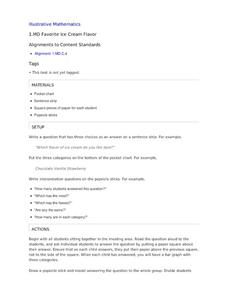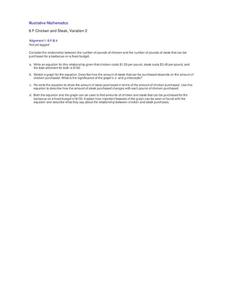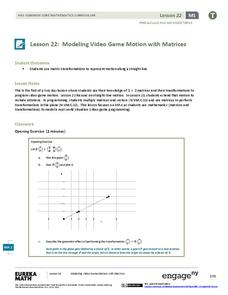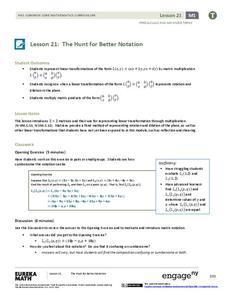Concord Consortium
Be Well
How much do you spend on healthcare each year? Data shows the expenditures in the US rise significantly each year. Young scholars use the data to calculate a rate of change over a 30-year period and look for—as well as provide— possible...
EngageNY
Complex Numbers as Vectors
Show your math class how to use vectors in adding complex numbers. Vectors represent complex numbers as opposed to points in the coordinate plane. The class uses the geometric representation to add and subtract complex numbers and...
Illustrative Mathematics
Mr. Brigg's Class Likes Math
A quick discussion question that brings some collaboration into your classroom will allow your thinkers to make a decision about sampling. Mr. Briggs wants to know if the results from his class are a valuable comparison to the entire...
Inside Mathematics
Two Solutions
Many problems in life have more than one possible solution, and the same is true for advanced mathematics. Scholars solve seven problems that all have at least two solutions. Then three higher-level thinking questions challenge them to...
Concord Consortium
Summertopia
What if the unit of money changes tomorrow? Would you be prepared? Learners calculate currency conversions using fictional units of money. The fictional unit's base is 60 rather than 100, which can connect to time or even degrees.
Del Mar College
Algebra Assessment Review
Jam packed with problems, this advanced Algebra worksheet focuses on topics such as domain, solving quadratics, solving rationals, and function notation.
Curated OER
Symmetry of the Addition Table
Help your class discover the commutative property of addition with this exploration of the addition table. By folding and coloring the table, a symmetry is found that directs students to an understanding of this crucial mathematical...
Illustrative Mathematics
Global Positioning System II
Intricate details of a modern technology that many of us take for granted in our phones, computers (and some cars) are laid bare in a short but deeply investigative activity. The math behind a seemingly simple GPS device...
EngageNY
End-of-Module Assessment Task — Precalculus (Module 1)
A transformational assessment determines how far pupils are advancing toward mastering complex and matrix standards. The assessment checks the learners' understanding of linear transformations, complex numbers and the complex plane,...
EngageNY
Complex Number Division 1
Conjugating in the math classroom — and we're not talking verbs! The seventh lesson in a series of 32 introduces the class to the building blocks of complex number division. During the instruction, the class learns to find the...
Illustrative Mathematics
Favorite Ice Cream Flavor
What better way to engage children in a math lesson than by talking about ice cream? Using a pocket chart or piece of chart paper, the class works together creating a bar graph of the their favorite ice cream flavors. Learners then work...
Illustrative Mathematics
Chicken and Steak, Variation 2
Many organizations put on barbecues in order to make money. In a real-world math problem, the money allotted to purchase steak and chicken at this barbecue is only one hundred dollars. It is up to your potential chefs to figure out how...
College Board
2016 AP® Statistics Free-Response Questions
Test your classes on their knowledge of advanced statistic concepts. Young math scholars get a sneak peek at the end of course AP® statistics exam with the released items from the 2016 test. The six-question free response exam addresses...
Balanced Assessment
Egyptian Statue
Investigate the proportional relationships of length, area, and volume. Learners use the dimensions of rectangular prisms to create ratios and proportions. They compare the different ratios to solve more advanced problems.
Concord Consortium
Adding the Sines
It's a sign! Scholars analyze sine functions for patterns in their periods. The exploration advances beyond a simple function to the combination of two functions with even and odd coefficients. Their goal is to find a pattern between the...
Curated OER
Alex, Mel, and Chelsea Play a Game
This short probability question may look simple at first, but it is actually quite complex! Learners must understand independent events in context and must take into account several different scenarios. Use as an individual assignment...
Illustrative Mathematics
What’s Missing?
Now you see them, now you don't! This fun peek-a-boo activity engages young mathematicians in developing their ability to compose and decompose numbers. After being presented with a series of counters, children close their eyes while the...
Curated OER
Sum of Even and Odd
Your algebra learners will make use of structure and manipulate expressions involving function notation using the definition of odd and even functions. They then advance even further to analyze the structure in a system of two equations.
EngageNY
Modeling Video Game Motion with Matrices 1
Video game characters move straight with matrices. The first day of a two-day lesson introduces the class to linear transformations that produce straight line motion. The 23rd part in a 32-part series has pupils determine the...
Illustrative Mathematics
Slopes and Circles
An upper-level treatment of what is often presented as a basic concept (the right angle of an inscribed circle on the diameter), this activity really elevates the mathematical thought of the learner! Expected to develop formulas...
EngageNY
Properties of Trigonometric Functions
Given a value of one trigonometric function, it is easy to determine others. Learners use the periodicity of trigonometric functions to develop properties. After studying the graphs of sine, cosine, and tangent, the lesson connects...
Illustrative Mathematics
Shape Hunt Part 2
Shapes are everywhere in the world around us, from rectangular doors to the circular wheels of a car. The second lesson in this series opens the eyes of young mathematicians to this wonderful world of shapes as they search the classroom,...
EngageNY
The Hunt for Better Notation
The matrix — it's not just a movie. The lesson introduces the concept of 2 x 2 matrix multiplication as a way to represent linear transformations. Class members determine when a linear transformation represented as matrix...
CPALMS
Writing an Exponential Function from its Graph
Grow an equation for the exponential graph. Given a graph of an exponential function, class members write the equation of the function provided. The graph labels two points on the graph: the y-intercept and the point where x is one.























